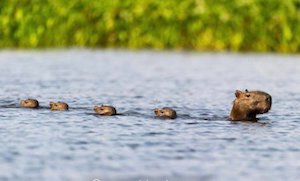Like the dragonfly trapped in my car
I beat against the windshield
uncomprehendingly seeking the light
but barred from it by some barrier
I cannot see. Sometimes flying the length
Quote Investigator – “This website records the investigatory work of Garson O’Toole who diligently seeks the truth about quotations. Who really said what? This question often cannot be answered with complete finality, but approximate solutions can be iteratively improved over time. Who uses this website?
Berejiklian called as ICAC witness while developer admits being 'tipsy' in Parliament offices
This is revenge for sports rorts': Australian National Audit Office funding cut
‘AWASH WITH DIRTY CASH’
In an opinion piece released days after the FinCEN Files, Linda A. Lacewell, the superintendent of one of New York's top banking regulatory bodies, acknowledged that the financial system is “awash with trillions of dollars in dirty money” and said that money laundering has wrapped itself “within the guts of financial institutions.”
“Individual bankers are rarely held accountable, so money laundering becomes a source of profits and bank fines become a cost of doing business,” Lacewell wrote. “When the profits exceed the fines, the business choice is easily corrupted.”
LAUNDERING IN LATVIA
Valdis Dombrovskis, executive vice-president of the European Commission and the former prime minister of Latvia, has defended his record on combating money laundering after the FinCEN Files detailed how, for years, global banks secretly believed his home country was a magnet for tens of billions of dollars in dirty money.
FINCEN FILES HIGHLIGHTS
We’re still pulling together the best FinCEN Files reporting from our media partners around the world. This week, our focus has been on Europe, where mafia groups, terror financiers, arms dealers and sanction busters all featured in stories published by our partners, who revealed how European banks and shell companies play a key role in global money laundering.
We’ve also mined our partners’ stories on the gold and precious metals industry, from Benin to Bolivia to Britain.
DOS SANTOS ENABLERS
Portuguese auditing companies that broke anti-money laundering laws while helping Angolan billionaire Isabel dos Santos grow her business empire should face criminal prosecution, the country’s regulator has said. Our Luanda Leaks investigation revealed Dos Santos and associates moved hundreds of millions of dollars in public money out of Angola, with help from Western financial firms, lawyers, accountants, including in Portugal.
BOTTLE OF LIES
We spoke with investigative journalist Katherine Eban about how she followed the story of fraud in generic drug manufacturing around the world for her latest, bestselling book Bottle of Lies: The Inside Story of the Generic Drug Boom. Eban will run a masterclass at the upcoming Double Exposure investigative film festival. You can purchase tickets to the festival with a 10% discount using ICIJ’s code: ICIJDX20.
CRIME OF THE CENTURY: Hacker Uploads Own Fingerprints To Crime Scene In Dumbest Cyber Attack Ever
BBC Future – Why smart people believe coronavirus myths – “..It is a sad truth that any health crisis will spawn its own pandemic of misinformation. In the 80s, 90s, and 2000s we saw the spread of dangerous lies about Aids – from the belief that the HIV virus was created by a government laboratory to the idea that the HIV tests were unreliable, and even the spectacularly unfounded theory that it could be treated with goat’s milk. These claims increased risky behaviour and exacerbated the crisis. Now, we are seeing a fresh inundation of fake news – this time around the coronavirus pandemic. From Facebook to WhatsApp, frequently shared misinformation include everything from what caused the outbreak to how you can prevent becoming ill. We’ve debunked several claims here on BBC Future, including misinformation around how sunshine, warm weather and drinking water can affect the coronavirus. The BBC’s Reality Check team is also checking popular coronavirus claims, and the World Health Organization is keeping a myth-busting pageregularly updated too…”
Privacy and security issues impact every aspect of our lives – home, work, travel, education, health and medical records – to name but a few. On a weekly basis Pete Weiss highlights articles and information that focus on the increasingly complex and wide ranging ways technology is used to compromise and diminish our privacy and security, often without our situational awareness. Four highlights from this week: CISA Releases Telework Essentials Toolkit; A New Tool for Detecting Deepfakes Looks for What Isn’t There: an Invisible Pulse; Collection and Use of Biometrics by U.S. Citizenship and Immigration Services; and What to do when someone steals your identity.
StatNews: “…Crows possess higher intelligence long thought a primarily human attribute - Research unveiled on Thursday in Science finds that crows know what they know and can ponder the content of their own minds, a manifestation of higher intelligence and analytical thought long believed the sole province of humans Andy i I a few other higher mammals. A second study, also in Science, looked in unprecedented detail at the neuroanatomy of pigeons and barn owls, finding hints to the basis of their intelligence that likely applies to corvids’, too.
Together, the two papers show that intelligence/consciousness are grounded in connectivity and activity patterns of neurons” in the most neuron-dense part of the bird brain, called the pallium, neurobiologist Suzana Herculano-Houzel of Vanderbilt University, who wrote an analysis of the studies for Science, told STAT. “Brains can appear diverse, and at the same time share profound similarities. The extent to which similar properties present themselves might be simply a matter of scale: how many neurons are available to work.”..A 2014 studyshowed that New Caledonian crows, rooks, and European jays can solve an Aesop’s Fable challenge, dropping stones into a water-filled tube to bring a floating bit of food within reach, something kids generally can’t do until age 7. These birds were the first nonhuman animals to solve the task…”
